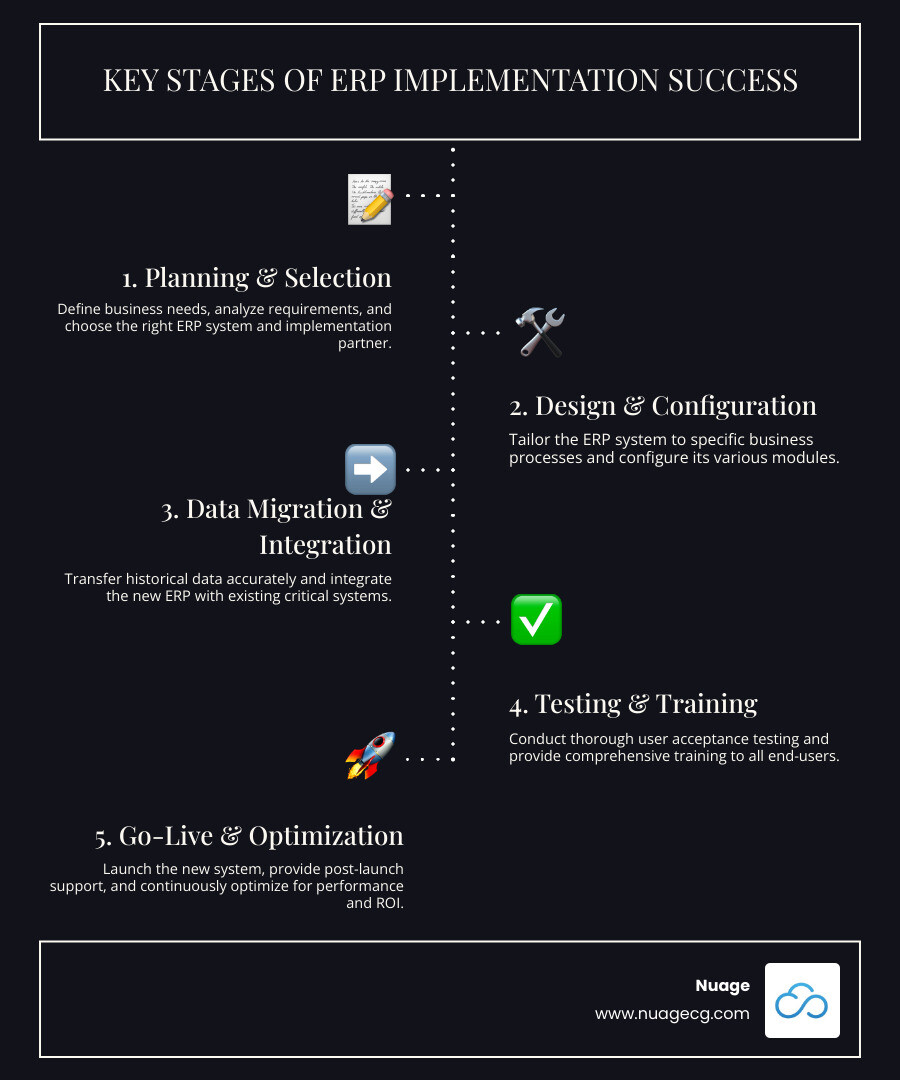
Why ERP Implementation in California Matters for Your Business Success
An ERP implementation California businesses undertake is a strategic move to stay competitive. Enterprise Resource Planning (ERP) integrates core business processes—finance, inventory, HR, and CRM—into a single, unified platform. This provides real-time visibility across your entire operation, which is essential in California’s trillion-dollar economy.
Quick Answer: Key Success Factors for ERP Implementation in California
- Choose the right system – Cloud-based solutions like NetSuite offer flexibility and scalability.
- Select an experienced partner – Look for proven track records with deep industry knowledge.
- Plan for change management – Most implementation challenges stem from people, not technology.
- Budget realistically – Include software, implementation, training, and ongoing support.
- Ensure compliance – Your ERP must support California-specific regulations like the CCPA.
- Focus on post-implementation – Proper optimization helps you use more than just 20% of your ERP’s capabilities.
In a state known for innovation, an ERP system is essential infrastructure. However, implementation is where many companies struggle with delays and cost overruns. Success depends on choosing the right system, selecting an experienced partner, and following a clear methodology from day one.
At Nuage, we specialize in NetSuite optimization and have guided dozens of California businesses through successful ERP implementation California projects. We’ve seen what separates a transformative implementation from one that just checks a box.

The Strategic Advantage of ERP for California’s Dynamic Economy
In California’s innovative market, an ERP system acts as the central nervous system for your business, unifying disparate departments like accounting, warehouse, sales, and HR into a single source of truth. This integration is why the global ERP market is projected to hit $78.4 billion by 2026—businesses are seeing measurable advantages.
Key benefits include:
- Streamlined Operations: Automating manual processes and eliminating redundant data entry speeds up everything from order fulfillment to financial reporting.
- Data-Driven Decisions: Real-time visibility allows you to spot trends, solve problems proactively, and capitalize on opportunities with actual data, not gut feelings.
- Increased Productivity: Teams can focus on high-value work instead of hunting for information across multiple systems.
- Scalability: A modern ERP grows with you, whether you’re a startup experiencing rapid expansion or an established company entering new markets. Systems like NetSuite are built for this flexibility.
- Competitive Advantage: Agility is key. An ERP helps you operate more efficiently and respond faster than competitors relying on outdated, patched-together systems.
Boosting Efficiency Across California’s Key Industries
An ERP implementation California businesses need must be custom to their specific industry:
- Technology & Startups: An ERP provides the operational backbone to scale without chaos, managing complex billing, recurring revenue, and audit-ready financials.
- Manufacturing & Distribution: ERP delivers complete supply chain visibility, from materials tracking to production planning and quality control. This is transformative for companies managing complex operations, as seen in our work with ERP solutions for manufacturing and the ERP implementation in the manufacturing industry.
- Agriculture: ERP helps optimize resource allocation, track inventory from field to customer, and ensure compliance tracking with food safety and environmental regulations.
- Entertainment & Retail: An ERP brings order to complex project finances, royalty payments, and multi-channel inventory management, providing deep insights into customer behavior.
Measuring the ROI of Your ERP Investment
An ERP’s return on investment is measurable. We help clients define Key Performance Indicators (KPIs) upfront, such as reducing order-to-cash cycles or decreasing inventory costs, to create clear benchmarks for success.
Understanding the Total Cost of Ownership (TCO)—including software, implementation, and ongoing support—is crucial. Cloud-based solutions like NetSuite often have a lower TCO by eliminating the need for on-premise hardware and maintenance.
Cost savings come from reduced manual labor, fewer errors, and optimized inventory. Revenue opportunities arise from improved customer service, faster product development, and strategic insights into profitability. A key, immediate benefit is faster financial close times, which frees up your finance team for strategic analysis and provides leadership with timely data for better decisions.
Choosing the Right ERP System for Your California Business
There is no single “best” ERP system. The goal of an ERP implementation California is to find the right fit for your specific business needs, much like choosing the right vehicle for a specific purpose.
Key decisions include:
- Cloud vs. On-Premise: Cloud ERP is accessed online and managed by the vendor, offering flexibility and lower upfront costs. On-premise systems are hosted on your own servers, giving you more control but requiring significant IT investment. Learn more about Cloud ERP System benefits and On Premise ERP Implementation considerations.
- Custom vs. Off-the-Shelf: While fully custom software is an option, the ideal solution is often a highly configurable off-the-shelf system that can be adapted to your workflows without extensive custom coding.
Your chosen system should provide core functionalities like financials, supply chain management, and CRM, along with industry-specific features custom to your sector.
The Rise of Cloud ERP in the Golden State
California businesses have accepted cloud ERP for its natural alignment with the state’s innovative and remote-work-friendly culture. The key advantages are clear:
- Agility and Flexibility: Easily scale operations up or down to meet market demands without being locked into fixed hardware investments.
- Remote Work Support: Provides secure, real-time data access for distributed teams across the state and beyond.
- Cost-Effectiveness: A predictable subscription model replaces large upfront capital expenditures on IT infrastructure.
- Automatic Upgrades: Vendors handle all updates, ensuring you always have the latest features and security patches without downtime.
- Data Security: Reputable cloud providers offer enterprise-grade security and compliance that often exceeds what individual businesses can manage on their own.
Oracle NetSuite is a popular choice as it was built for the cloud from day one. Our experience with Netsuite ERP Implementation confirms its suitability for California’s diverse business landscape.
Key ERP Innovations for California’s Forward-Thinking Businesses

Modern ERP systems offer cutting-edge features that provide a competitive advantage:
- Artificial Intelligence (AI): AI-powered forecasting analyzes historical data and market trends to predict future demand, optimizing inventory and financial planning.
- Mobile ERP Accessibility: Full system access from any device allows teams to work effectively from anywhere.
- Advanced Customization: Low-code/no-code platforms empower your team to tailor workflows and build reports without relying on IT resources.
- Integrated Business Intelligence: Centralized dashboards provide a complete, real-time picture of your business, enabling faster and more informed decisions.
Navigating the Challenges of an ERP Implementation in California
ERP implementation California projects are complex and can present significant challenges. However, with proper planning and an experienced partner, these problems are entirely manageable.
The most common challenges include:
- Data Migration: Moving historical data from legacy systems requires careful cleaning, validation, and a phased approach to ensure data integrity in the new system.
- Change Management: Up to 70% of implementation issues are people-related. A new ERP changes established habits, and resistance is natural. Effective change management involves clear communication, user involvement, and comprehensive training to drive adoption.
- Post-Implementation Support: The work isn’t over at go-live. Without ongoing optimization, most companies only use about 20% of their ERP’s full potential. Structured post-go-live support is crucial for maximizing your investment. Our ERP Implementation services and ERP Deployment Best Practices cover this in detail.
- Scope Creep: Adding new requirements mid-project can lead to delays and budget overruns. A clearly defined scope is essential.
To ensure success, it’s critical to avoid common pitfalls like a lack of executive sponsorship, poor data quality, and inadequate user training.
Budgeting for Your California ERP Implementation
Understanding the total financial commitment is key. Your budget should account for several components:
- Software Licensing: Cloud systems like NetSuite typically use a subscription model based on user count and required modules.
- Implementation & Consulting Fees: This covers the expert services needed to configure the system, migrate data, and manage the project.
- Customization: While modern ERPs are highly configurable, some unique processes may require custom development.
- Training: A crucial investment to ensure your team can use the new system effectively.
- Ongoing Support: Budget for post-go-live technical assistance and optimization to ensure the ERP evolves with your business.
For more on this, explore our guides on Netsuite Implementation Cost and Netsuite Implementation Costs.
Legal and Regulatory Compliance in California
California’s stringent regulatory environment makes compliance a fundamental part of any ERP implementation California. Your system must be configured to handle:
- Data Security: Robust access controls, encryption, and regular audits are necessary to protect sensitive customer and employee data.
- The California Consumer Privacy Act (CCPA): Your ERP must support consumer rights regarding personal data, including requests for access and deletion. Review the official California Consumer Privacy Act (CCPA) guidance for details.
- Data Governance: The system should enforce data retention policies and maintain clear audit trails to demonstrate compliance.
Addressing these requirements during implementation protects your business and builds trust with your customers.
Selecting the Best ERP Implementation Partner in California
The success of ERP implementation California projects often depends more on the implementation partner than the software itself. A great partner acts as an experienced guide, bringing deep system knowledge, industry best practices, and proven project management to accelerate your timeline and help you avoid common pitfalls.
When evaluating partners, you’ll find vendor-direct services and specialized consulting firms. While vendors know their product, specialized firms like Nuage focus on your business needs first. We offer corporate-level expertise—backed by over 1,500+ successful projects—with the agility and personalized approach of a boutique firm. We act as your “NetSuite Optimization Engine,” dedicated to opening up the full potential of your investment. Learn more about our approach in our guide to ERP Implementation Consulting.
What to Look for in an ERP Consultant or Firm
When evaluating partners, look for:
- A Proven Methodology: A structured approach for discovery, configuration, data migration, testing, and go-live ensures the project stays on track.
- Industry-Specific Knowledge: Your partner should understand the unique challenges and regulatory landscape of your industry in California.
- Technical Certifications: Ensure the consultants are certified in the platform you’re implementing, such as NetSuite.
- Client Testimonials and Case Studies: Look for real-world proof of success from businesses similar to yours.
A trusted advisor who helps you implement Netsuite Implementation Best Practices is invaluable. For more tips, see our article on choosing an ERP Software Implementation Consultant.
The Value of a Local California-Based Partner

Partnering with a California-based firm offers distinct advantages for your ERP implementation California project:
- Local Market Understanding: A local partner understands the state’s unique business environment, from Silicon Valley’s pace to Central Valley’s agricultural cycles.
- On-Site Support: While much can be done remotely, having a local presence is invaluable for critical workshops, training, or go-live support.
- Regulatory Expertise: A local partner has hands-on experience helping California businesses steer complex state regulations like the CCPA.
Our Manhattan Beach office means we are part of the California business community, combining deep NetSuite expertise with a genuine understanding of the local market. This is a key reason businesses seek out local Netsuite ERP Implementation Partners.
Frequently Asked Questions about ERP Implementation in California
Here are answers to common questions about starting an ERP implementation California journey.
How long does an ERP implementation take in California?
A typical mid-sized ERP project in California takes between 6 to 12 months. However, the timeline depends on several factors:
- Business Complexity: A large enterprise with multiple locations will take longer than a small business with simple processes.
- Scope: The number of modules, amount of data migration, and level of customization all impact the duration.
- Team Readiness: The availability and engagement of your internal team is critical.
A clear project methodology and tightly managed scope are the best tools for staying on schedule. Rapid deployment options are also available for businesses with simpler needs, sometimes allowing for a go-live in as little as 100 days.
What’s the difference between ERP for a small business vs. a large enterprise?
The core goal of process integration is the same, but the scale and complexity differ significantly.
- Small to Mid-Sized Businesses (SMBs): Need scalable, cost-effective systems. Cloud solutions like NetSuite are ideal due to their lower upfront costs and subscription-based pricing. SMBs often benefit from adapting their processes to the ERP’s standard, best-practice workflows.
- Large Enterprises: Require robust systems that can handle massive transaction volumes, global operations, and complex, specialized workflows. They often have larger budgets and more extensive customization and integration requirements.
We tailor our approach to fit your company’s specific scale and needs, whether you’re a growing startup or an established corporation.
What happens after the ERP system goes live?
Go-live is the beginning, not the end. The post-implementation phase is crucial for maximizing your ROI.
- Stabilization and Optimization: After a brief adjustment period, the focus shifts to continuous improvement. A good partner provides ongoing support to fine-tune configurations, develop new reports, and help you explore advanced features.
- Ongoing User Training: Continuous education for new hires and existing employees ensures everyone uses the system effectively.
- Maximizing ROI: Most businesses initially use only a fraction of their ERP’s capabilities. As your “NetSuite Optimization Engine,” our goal is to help you open up the system’s full value over time, ensuring it remains a strategic asset that drives long-term growth.
Conclusion: Your Next Step Towards a Successful ERP Journey
Navigating an ERP implementation California is a significant undertaking, but it’s one of the most transformative investments you can make. Success hinges on clear planning, proactive change management, and choosing a partner who understands your business and the local market.
An ERP is more than a technology upgrade; it’s a strategic foundation for future growth. At Nuage, our NetSuite optimization experts leverage over 20 years of experience to guide California businesses through this digital change. We don’t just implement software; we partner with you to determine the best solutions and act as your dedicated “NetSuite Optimization Engine” to open up your business’s full potential.
Ready to start your journey? Explore our NetSuite solutions to see how we can help you succeed.
